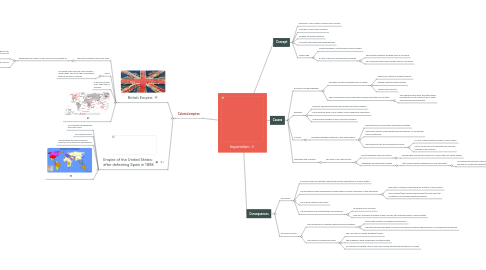
1. Colonial empires
1.1. British Empire:
1.1.1. The most important colony was India.
1.1.1.1. The British took control of the Suez Canal and Egypt to:
1.1.1.1.1. Protect against the Russian and French advance.
1.1.1.1.2. Secure the route to India.
1.1.2. África
1.1.2.1. He moved north from the Cape trying to reach Egypt. This led to the confrontation with the French in Fachoda.
1.1.3. It also has Canada and a large part of Oceania.
1.1.4. ...
1.2. Empire of the United States: after defeating Spain in 1898
1.2.1. He occupied the Philippines and Puerto Rico.
1.2.2. He controlled Cuba.
1.2.3. He submitted the Ibero-American countries to an economic dependency.
1.2.4. ...
2. Concept
2.1. extension of one country's domain over another
2.2. Metropoli: country that conquers
2.3. Cologne: conquered territory
2.4. In ancient times there were great empires
2.5. Modern age
2.5.1. Several European countries were colonial powers
2.5.2. in 1870 a new form of imperialism emerges
2.5.2.1. the imperialist powers annexed most of the world
2.5.2.2. you could say that europe was the owner of the world
3. Causes
3.1. Economic and demographic:
3.1.1. European countries needed spaces in which:
3.1.1.1. Invest your capitals at a higher interest.
3.1.1.2. Obtener materias primas baratas.
3.1.1.3. Vender sus productos.
3.1.2. The colonies were places where the European population could settle.
3.1.2.1. The Industrial Revolution facilitated these movements for the construction of faster and more efficient transports.
3.2. Religious:
3.2.1. Desire to Christianize peoples who preserve primitive religions.
3.2.2. The missionary work of the Catholic Church had great importance.
3.2.3. Missions were founded in Asia, Africa and Oceania.
3.3. Policies:
3.3.1. He obeyed strategic demands of the great powers.
3.3.1.1. They wanted to increase their international prestige.
3.3.1.2. Make public opinion forget defeats and humiliations. or consolidate national sentiment.
3.3.1.3. They wanted to join the colonization process.
3.3.1.3.1. For fear of the increase of power of one of them.
3.3.1.3.2. Not to be left out of the benefits that could be obtained in the colonies.
3.4. Ideological and scientific:
3.4.1. The West in the 19th century:
3.4.1.1. Racist ideologies were very strong.
3.4.1.1.1. They thought they had the mission to civilize other non-white people.
3.4.1.2. Geographic societies were created:
3.4.1.2.1. They made scientific expeditions all over the planet.
4. Consequences
4.1. Economics
4.1.1. Economy based on plantation agriculture and the exploitation of mineral wealth.
4.1.2. The populations were dispossessed of their lands by private companies of the metropolis.
4.1.2.1. They had no interest in developing the industry of the colonies.
4.1.2.2. Local artisans (they became impoverished) did not resist the competition of European industrial products.
4.1.3. The Indians became cheap labor.
4.1.4. The colonizers built transportation manufactures:
4.1.4.1. To develop your activities.
4.1.4.2. They do not benefit the whole of the colonies, they remained poorly communicated.
4.2. Social and cultural:
4.2.1. The introduction of Western sanitary practices allowed:
4.2.1.1. Reduce the mortality of indigenous populations.
4.2.1.2. The birth rate remained high. It causes a remarkable increase in the population. It provoked strong famines.
4.2.2. The rupture of traditional society.
4.2.2.1. The colonizers occupied the highest levels.
4.2.2.2. The indigenous were marginalized or exterminated.
4.2.2.3. Acculturation emerged: Loss of one's own culture through the imposition of another.

